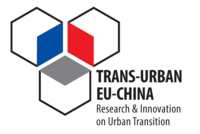
TRANS-URBAN-EU-CHINA
Transition towards urban sustainability through socially integrative cities in the EU and in China
COMPENDIUM – Compendium of Tools for Socially Integrative Cities
The COMPENDIUM aims to serve as an inspiration for making urban development more sustainable and socially integrative. It is an online instrument where interested parties from practice and academia can find a collection of 38 tools and measures, which are apt and have proven in documented good practice examples to contribute to strengthening and accelerating the transition towards socially integrative cities in Europe and/or China. The compilation of the described tools and measures play an important role as a coordinated joint result across all workpackages of the project. Consequently, more information about the tools and measures can be found under the respective project deliverables of workpackages 1 to 5.
The short articles, which describe the tools, follow an identical structure: First, the authors, mentioned at the end of each contribution, summarise the purpose of the respective instrument. Afterwards, they depict its relevance and impact, including a description of whether and how the instrument was tested within the framework of the urban living lab activities of the project, as well as its strengths and weaknesses. Finally, they refer to documented good practice examples from Europe and/or China. References complete each description. If possible, additional visual material is provided. Moreover, the authors mention links where additional material regarding good practice examples can be found.
The TRANS-URBAN-EU-CHINA partners, while analysing good practice examples in Europe and China, identified and compiled a set of 38 tools and measures for strengthening and accelerating the transition towards socially integrative cities in Europe and/or China. Furthermore, they discussed these instruments and their application/applicability with practitioners from China and Europe, especially during urban living lab oriented online workshops in 2020.
In a few cases, tools were explicitly tested in the urban living lab context, especially if they were newly developed by TRANS-URBAN-EU-CHINA partners during the project, such as the SITEE Replicability Tool. However, due to the Covid-19 crisis, in most cases, project partners could only analyse the application and applicability of tools based on god practice examples from cities in Europe and/or China and online discussions with experts form practice and academia. Thus, the innovation of the COMPENDIUM mainly consists in bringing this array of 38 tools together, as it was not possible to explicitly test all of them during the project period.
The section about the relevance and impact of tools describes in each case whether a tool has been tested on a large scale in the project or whether it was only discussed with practitioners from China and Europe during online workshops in 2020. In cases in which a tool was explicitly tested in the framework of TRANS-URBAN-EU-CHINA (e.g., SITEE Replicability Tool), the results are described and discussed in the same section. In all cases, Chinese practitioners showed their interest in the proposed tools, and confirmed, in general, their potential applicability in the Chinese context.
The content of the COMPENDIUM was elaborated and is presented under the full responsibility of the authors of the tool descriptions. The Compendium does not reflect the official opinion of the European Commission. The TRANS-URBAN-EU-CHINA project or the European Commission are not liable for the contents of the tool descriptions and the provided visual material, or any use that may be made of the information contained therein.